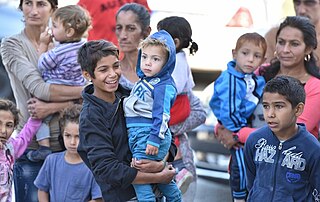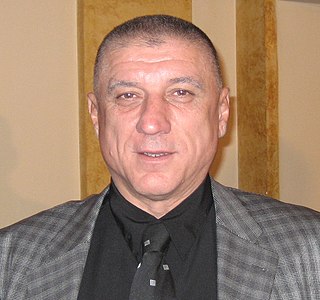
The Federation of Bosnia and Herzegovina is one of the two entities composing Bosnia and Herzegovina, the other being Republika Srpska. The Federation of Bosnia and Herzegovina consists of ten autonomous cantons with their own governments and legislatures.

The Posavina Canton is one of ten cantons of the Federation of Bosnia and Herzegovina in Bosnia and Herzegovina. It is the smallest canton with an area of only 330.85 km2 (128 sq mi). The canton is an exclave of Federation of Bosnia and Herzegovina, being bordered by Republika Srpska and Brčko District to the south and the river Sava and Croatia to the north. Its capital is Orašje and the largest town is Odžak.

Unit for Special Operations or Special Operations Unit, also known as Red Berets or Frankies, was an elite special forces police unit of Serbian State Security Directorate (RDB).

Brčko is a city and the administrative seat of Brčko District, in northern Bosnia and Herzegovina. It lies on the banks of Sava river across from Croatia. As of 2013, it has a population of 39,893 inhabitants.
Bosnia and Herzegovina, like many countries, is made of geographical, historical, and political regions. The current geopolitical regions were finalised with the signing of the Dayton Agreement.

Law enforcement in Croatia is the responsibility of the Croatian Police, which is the national police force of the country subordinated by the Ministry of the Interior of the Republic of Croatia, carrying out certain tasks, the so-called, police activities, laid down by law.
The Serbian Police, formally the Police of the Republic of Serbia, is the national civilian police force of the Serbia. The Serbian Police are responsible for all local and national law enforcement. It is under the jurisdiction of the Ministry of Internal Affairs.

The Special Anti-Terrorist Unit is an elite tactical unit of the Serbian Police.

The Ministry of the Interior of the Republic of Croatia is the ministry in the Government of Croatia which is in charge of state security among other roles. Croatian Police is a public service of the Ministry of the Interior.

The Xoraxane in Bosnia and Herzegovina are the largest of the 17 national minorities in the country, although—due to the stigma attached to the label—this is often not reflected in statistics and censuses.

The Police of Republika Srpska is the executive and operative agency of the Ministry of Interior of Republika Srpska, and is headquartered in Banja Luka.

The order of battle of the Croatian Special Police Units in 1991–1995 included up to 30 individual special forces units subordinated to the Ministry of the Interior. The special police was created around the Ministry of the Interior's existing airborne special forces unit following an open revolt of the Croatian Serbs against the Government of Croatia in August 1990. It further developed with the increasing involvement of the Yugoslav People's Army in the conflict, supporting the Croatian Serbs. The conflict escalated into the Croatian War of Independence in 1991. The special police took part in the first clashes of the war in Pakrac and at the Plitvice Lakes. As Croatia had no army, the 3,000-strong special forces became the country's most effective fighting force.

The 2014 unrest in Bosnia and Herzegovina was a series of demonstrations and riots that began in the northern town of Tuzla on 4 February 2014 but quickly spread to multiple cities in Bosnia and Herzegovina, including Sarajevo, Zenica, Mostar, Jajce, and Brčko, among others, for social reasons and with the aim of overthrowing the government. The riots were the most violent scenes the country had seen since the end of the Bosnian War in 1995. The rioting largely took place in the entity of Federation of Bosnia and Herzegovina, and the same level of unrest or activism did not occur in Republika Srpska.
The Special Police Units or Police Special Units was a special police force unit of Serbia's Ministry of Internal Affairs (MUP). It had several detachments and was part of the sector of the State Security Directorate. It was disbanded on 28 June 2001 when it was replaced by the re-establishment of the Gendarmery.

The Special Anti-Terrorist Unit of Ministry of Interior of Republika Srpska is a special police and security force unit of the Police of Republika Srpska, one of two autonomous entities that comprise Bosnia and Herzegovina.

The Honour Unit of Ministry of Interior of Republika Srpska is a ceremonial unit of the Ministry of Interior of Republika Srpska.

Despot is a multi-functional armoured vehicle developed by the arms manufacturer Tehnički remont Bratunac in Bratunac, Republika Srpska, Bosnia and Herzegovina.

Municipal elections were held in Bosnia and Herzegovina on 15 November 2020 to elect mayors and assemblies in 143 municipalities. Originally scheduled for 4 October, they were postponed due to a lack of funds.

Dragan Vikić is a Bosnian former military officer with the Army of the Republic of Bosnia and Herzegovina during the Bosnian War.















